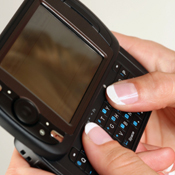
I had come across a blog post explaining a gender study titled, "When Texting, Eligible Woman Express Themselves Better". The blog post was very interesting to me at first, until I had come across another blog post from 2006 titled "Women Talk Three Times As Much As Men, Says Study" that made me question certain aspects of studies - then science in general as well. And this is my opinion on the study in detail.
False Reactions
The popularity of texting on cell phones has drastically exceeded the popularity of phone conversations; there are many more texters than callers. Even at my high school, Pascack Hills, the constant text messaging forced authorities to become overly strict with the rule of ‘no cell phones in school’.
However, it hadn’t occurred to me - until the article “When Texting, Eligible Women Express Themselves Better” - how the increase of texting has an affect on the differences of gender. According to the article, historically, women were known to be more proper and polite than men in speech (“WTEWETB” par. 3). But when texting, it becomes the opposite. The researchers expected men to send more texts that were generally longer, using the standard “texting language” (“WTEWETB” par. 6). However, men texted less in quantity and shorter messages that used proper language, falling short of the hip-hop texting quality. Women, on the other hand, texted in message slang, using abbreviations such as ‘lol’ or ‘omg’, also adding symbols, smilies, and other tools that emphasizes their emotions in their electronic messages (“WTEWETB” par.7). The article also states that women texted longer messages, maxing out the 160-character limit much more than men.
This new research shows that historical observations are changing as women gain more independence and respect from society. Published to show how the results exemplify the shift, the results are “shocking” to the researchers. However, the researchers seem to have neglected other studies that state that women have more to say than men. A study on this observation stated that in fact “women talk almost three times as much as men, with the average woman chalking up 20,000 words in a day – 13,000 more than the average man” (Macrae par. 2). This study – published in the year 2006 – does not seem to influence the research about the differences in texting according to gender. If taken into account the study of women being more talkative (by nature), the result of the study in the article “When Texting Eligible Women Express Themselves Better” is very predictable. Although the researchers’ hypotheses that women should have texted more formally may be true, the result of woman maxing the character limit more than men is not a shocking result to the study (“WTEWETB” par. 7). It seems as if the research seems very futile and adding little to the study of gender differences in various aspects of life. It’s like telling a blue pen that when written with it, it will be blue. Yes – it will be. Bottom line is: the results are agreeable, but the reaction to the results is not. Why professional scientists have neglected previous studies, which reason their results, is beyond me. If they did take into account studies such as the one published by Macrae, the research definitely would’ve received a different reaction from the public and the researchers themselves.
If this study is not the only study to observe data and social behaviors that neglect other studies, which would cancel out their studies, science is not advancing in its knowledge of gender differences. The information fed to the public is false to a certain extent. People would be rowdy over evident results that, in reality, do not further studies at all. This blog post about eligible women expressing themselves better when texting is a prime example of a futile research; what’s the point then? Why study these if the researchers won’t carefully fulfill their studies covering every inch of research (even if it requires much more in-depth studies)? Instead of shedding light on science, “When Texting, Eligible Women Express Themselves Better” displays the setbacks of science today.